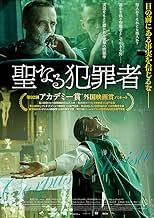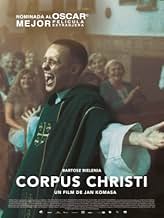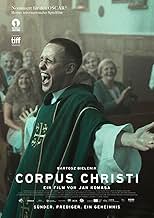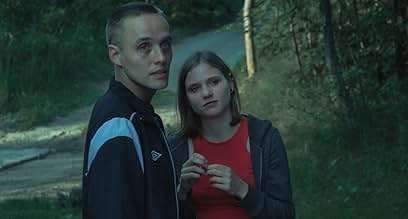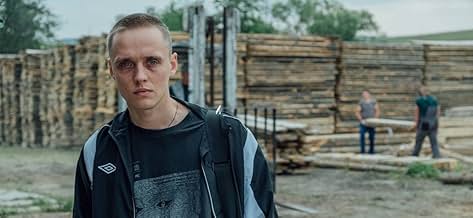VALUTAZIONE IMDb
7,7/10
22.610
LA TUA VALUTAZIONE
Daniel sperimenta un'evoluzione spirituale in un centro di detenzione. Sebbene la sua fedina penale gli impedisca di fare domanda per il seminario, non rinuncia al suo sogno e decide di fare... Leggi tuttoDaniel sperimenta un'evoluzione spirituale in un centro di detenzione. Sebbene la sua fedina penale gli impedisca di fare domanda per il seminario, non rinuncia al suo sogno e decide di fare il sacerdote della parrocchia di un paese.Daniel sperimenta un'evoluzione spirituale in un centro di detenzione. Sebbene la sua fedina penale gli impedisca di fare domanda per il seminario, non rinuncia al suo sogno e decide di fare il sacerdote della parrocchia di un paese.
- Candidato a 1 Oscar
- 54 vittorie e 40 candidature totali
Lidia Bogaczówna
- Mother
- (as Lidia Bogacz)
Trama
Lo sapevi?
- QuizA fictional story but based on a book exploring the surprisingly common multiple stories of clerical impostors in Poland, a phenomenon more prevalent than even the film-makers themselves expected. Most of Corpus Christi was shot in a remote village in the Carpathian foothills, where the crew soon began to feel that locals were a little cagey when the film's topic was broached. It was only when the shoot was over that they discovered that the village had its very own real history of a bogus priest. The impersonator had gotten away with it for two years before being rumbled.
- ConnessioniFeatured in The Oscars (2020)
Recensione in evidenza
The story in 'Corpus Christi' (2020), the film by Polish director Jan Komasa, takes place in contemporary Poland. It belongs to a category of films coming from the former communist states in Eastern Europe, which portray in various forms the religious renaissance and the growing role that national churches play in people's lives and in the social and spiritual structure of post-communist societies in these countries. At the same time, the film discusses universal issues about people's ability to forgive, about the social reintegration and spiritual recovery of those who have served their sentences for past crimes, and about those who are or may be the spiritual leaders of communities. It is a film about faith and atonement, but at the same time a brutal and quite pessimistic film. In any case, the cinematic experience is powerful.
The hero of the film is a character descended as if from Dostoevsky's novels. In him are gathered simultaneously good and evil, God and the Devil, Dr. Jekyll and Mr. Hyde, the juvenile delinquent Daniel and Father Thomas. Being released from the toxic environment of the prison where he still had time to study theology and to watch if not to officiate religious services, the young Daniel (the extraordinary Bartosz Bielenia) is assigned to a remote village in Poland but instead of working in the factory of timber he was sent to, he ends up, more or less by chance, being confused with a young priest, a recent graduate of the theological seminary. He had dreamed of becoming a priest, he had the vocation and the charisma, but he had not been able to achieve his goal due to his criminal record. He does not refuse the opportunity to assume the role of the priest at the pulpit when the local priest asks him to take his place while he treats his illness. Soon the young and unconventional 'priest' becomes the spiritual leader of a small rural community facing the specific problems of the transition period in Eastern Europe (lack of interest and especially lack of faith from the parishioners, disoriented and futureless youth seeking refuge in alcohol and drugs) but also confronted with the trauma of a car accident in which seven inhabitants of the village perished in an instant, an accident that traumatised the families and segmented the community that ostracises the widow of the alleged culprit. Gradually gaining the trust of the villagers, 'Father Thomas' enters in conflict with the local baron, the holder of the political power (he is also mayor of the village) and of the economic power (as owner of the sawmill). The threat is twofold. Thomas is bitten by his own doubts, and knows that sooner or later what in the eyes of the authorities (church, legal) is an imposture will be discovered. Will the call and good done in the name of the Lord be enough to save him?
Not being a religious person or a good connoisseur of Catholic rites, it is difficult for me to appreciate how credible the details of this story are, although I am reading that it has its origin in various real facts. Beyond the so-called technical aspects, the film asks some valid questions in any other beliefs or moral systems. Can a sinner, a murderer become a source of good, a leader or mentor of a community? Can good deeds absolve those who committed grave mistakes (sins) in the past? Does the cassock make the priest or his deeds and the way he inspires his parishioners? If there is one message to resume this film that at times manages to be sublime and emotional, and at other times pessimistic and brutal, it would be that the answers given to these questions by the legal system according to the scale of social values and even by the institution of the church are different than those that inspire faith in the hearts of those who believe. The film is very well written and produced, the story has rhythm and fluency, the cinematography is expressive. The success of 'Corpus Christi' in places where it has been seen so far is largely due to the exceptional performance of Bartosz Bielenia, an actor of great talent and intensity, who manages to render the whole complexity of the character, with his contradictions and internal fires. The merit of director Jan Komasa is that he manages to ask important questions and lets us judge and answer ourselves, the spectators. 'Corpus Christi' is full of details about church life but you don't have to be a Catholic or a believer to resonate with the dilemmas and feelings of its hero. Same as Father Thomas's sermons and words which are addressed to all the villagers, believers or not, Jan Komasa's film is addressed to all audiences.
The hero of the film is a character descended as if from Dostoevsky's novels. In him are gathered simultaneously good and evil, God and the Devil, Dr. Jekyll and Mr. Hyde, the juvenile delinquent Daniel and Father Thomas. Being released from the toxic environment of the prison where he still had time to study theology and to watch if not to officiate religious services, the young Daniel (the extraordinary Bartosz Bielenia) is assigned to a remote village in Poland but instead of working in the factory of timber he was sent to, he ends up, more or less by chance, being confused with a young priest, a recent graduate of the theological seminary. He had dreamed of becoming a priest, he had the vocation and the charisma, but he had not been able to achieve his goal due to his criminal record. He does not refuse the opportunity to assume the role of the priest at the pulpit when the local priest asks him to take his place while he treats his illness. Soon the young and unconventional 'priest' becomes the spiritual leader of a small rural community facing the specific problems of the transition period in Eastern Europe (lack of interest and especially lack of faith from the parishioners, disoriented and futureless youth seeking refuge in alcohol and drugs) but also confronted with the trauma of a car accident in which seven inhabitants of the village perished in an instant, an accident that traumatised the families and segmented the community that ostracises the widow of the alleged culprit. Gradually gaining the trust of the villagers, 'Father Thomas' enters in conflict with the local baron, the holder of the political power (he is also mayor of the village) and of the economic power (as owner of the sawmill). The threat is twofold. Thomas is bitten by his own doubts, and knows that sooner or later what in the eyes of the authorities (church, legal) is an imposture will be discovered. Will the call and good done in the name of the Lord be enough to save him?
Not being a religious person or a good connoisseur of Catholic rites, it is difficult for me to appreciate how credible the details of this story are, although I am reading that it has its origin in various real facts. Beyond the so-called technical aspects, the film asks some valid questions in any other beliefs or moral systems. Can a sinner, a murderer become a source of good, a leader or mentor of a community? Can good deeds absolve those who committed grave mistakes (sins) in the past? Does the cassock make the priest or his deeds and the way he inspires his parishioners? If there is one message to resume this film that at times manages to be sublime and emotional, and at other times pessimistic and brutal, it would be that the answers given to these questions by the legal system according to the scale of social values and even by the institution of the church are different than those that inspire faith in the hearts of those who believe. The film is very well written and produced, the story has rhythm and fluency, the cinematography is expressive. The success of 'Corpus Christi' in places where it has been seen so far is largely due to the exceptional performance of Bartosz Bielenia, an actor of great talent and intensity, who manages to render the whole complexity of the character, with his contradictions and internal fires. The merit of director Jan Komasa is that he manages to ask important questions and lets us judge and answer ourselves, the spectators. 'Corpus Christi' is full of details about church life but you don't have to be a Catholic or a believer to resonate with the dilemmas and feelings of its hero. Same as Father Thomas's sermons and words which are addressed to all the villagers, believers or not, Jan Komasa's film is addressed to all audiences.
I più visti
Accedi per valutare e creare un elenco di titoli salvati per ottenere consigli personalizzati
- How long is Corpus Christi?Powered by Alexa
Dettagli
- Data di uscita
- Paesi di origine
- Siti ufficiali
- Lingua
- Celebre anche come
- Тіло Христове
- Luoghi delle riprese
- Aziende produttrici
- Vedi altri crediti dell’azienda su IMDbPro
Botteghino
- Lordo Stati Uniti e Canada
- 127.240 USD
- Fine settimana di apertura Stati Uniti e Canada
- 4.632 USD
- 16 feb 2020
- Lordo in tutto il mondo
- 9.943.901 USD
- Tempo di esecuzione1 ora 55 minuti
- Colore
- Mix di suoni
- Proporzioni
- 2.39 : 1
Contribuisci a questa pagina
Suggerisci una modifica o aggiungi i contenuti mancanti

Divario superiore
By what name was Corpus Christi (2019) officially released in India in Hindi?
Rispondi
![Guarda Trailer [OV]](https://m.media-amazon.com/images/M/MV5BNjE0ZDQ4MDMtOWQzMy00NTUzLWExNzYtOWJlNGExNjBlYzAxXkEyXkFqcGdeQXRyYW5zY29kZS13b3JrZmxvdw@@._V1_QL75_UX500_CR0)
